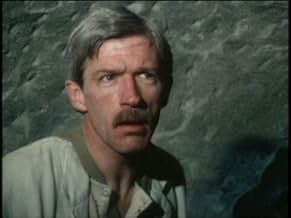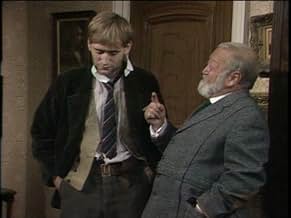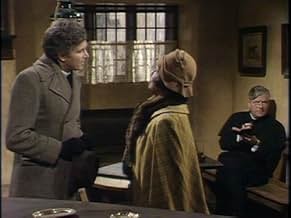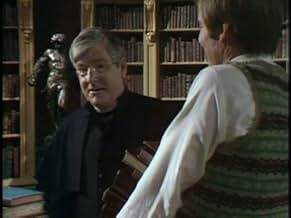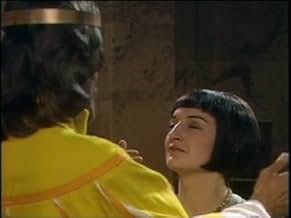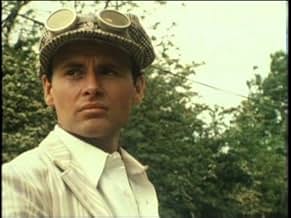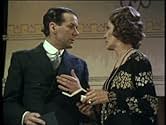Adicionar um enredo no seu idiomaBased on the stories of G.K. Chesterton, a British Catholic Priest solves mysteries.Based on the stories of G.K. Chesterton, a British Catholic Priest solves mysteries.Based on the stories of G.K. Chesterton, a British Catholic Priest solves mysteries.
Explorar episódios
Avaliações em destaque
G. K. Chesterton wrote after Conan Doyle invented Sherlock Holmes but (mostly) before Agatha Christie's reign. His detective Father Brown is an inoffensive little priest who knows a lot about crime, from years of hearing confessions. So he can see what others can't.
Here's an example (and since this story wasn't in the series it's not a spoiler). A headless man is found. His house is scattered with snuff; with clockwork like destroyed toys of the period; and with other bizarre things.
Father Brown (I won't give away how) figures out that the man left everything in the Will is scrupulously honest. He was left all the man's "gold." So he takes the man's collection of gold snuff boxes but not the snuff; he takes the man's gold watch-cases but not the watches; and as for beheading the man, since he was dead anyway it was easier to remove the man's gold teeth.
Chesterton's stories are less who-dun-its than puzzles to be solved. And they may have a theological point. Often this is said it's because Chesterton was such a strong Catholic, but his conversion to Catholicism came after he'd created Father Brown and had written most of his stories.
Whether Father Brown's stories could make a viable series like Brett's "Sherlock Holmes" or Suchet's "Poirot" or Hickson's "Miss Marple" is debatable. Some of Chesterton's Father Brown stories (which I love) are great while others are slight to plump out an hour apiece. And since Chesterton liked to serve everything up with a taste of humor he's often presented as a silly rather than a serous writer. Serious writers, it seems, shouldn't have a sense of humor. Baloney.
(Forget the Mark Williams reboot; all it has in common with Chesterton's stories is the main title).
This series has some poor production values and acting. Even the great Kenneth More appears miscast as Father Brown. A fine actor, More's performances have always been of characters who are sharp and smart, not low-key characters who appear silly on the outside, even if they are cleverer than everyone else on the inside. I've always appreciated Kenneth More's acting, but he's not that good at hiding his light under a bushel the Father Brown way.
When I first caught this in high school (fifteen years before I cared to read Chesterton, now one if my favorite authors) I was accustomed to British TV presentation with great actors performing in long takes on videotape on cheap-looking sets and with outdoors scenes on grainy film. Nowadays I'm more accustomed to slicker productions where the actors practically whisper. So the series looks old and creaky. Too bad. Chesterton deserves better.
Here's an example (and since this story wasn't in the series it's not a spoiler). A headless man is found. His house is scattered with snuff; with clockwork like destroyed toys of the period; and with other bizarre things.
Father Brown (I won't give away how) figures out that the man left everything in the Will is scrupulously honest. He was left all the man's "gold." So he takes the man's collection of gold snuff boxes but not the snuff; he takes the man's gold watch-cases but not the watches; and as for beheading the man, since he was dead anyway it was easier to remove the man's gold teeth.
Chesterton's stories are less who-dun-its than puzzles to be solved. And they may have a theological point. Often this is said it's because Chesterton was such a strong Catholic, but his conversion to Catholicism came after he'd created Father Brown and had written most of his stories.
Whether Father Brown's stories could make a viable series like Brett's "Sherlock Holmes" or Suchet's "Poirot" or Hickson's "Miss Marple" is debatable. Some of Chesterton's Father Brown stories (which I love) are great while others are slight to plump out an hour apiece. And since Chesterton liked to serve everything up with a taste of humor he's often presented as a silly rather than a serous writer. Serious writers, it seems, shouldn't have a sense of humor. Baloney.
(Forget the Mark Williams reboot; all it has in common with Chesterton's stories is the main title).
This series has some poor production values and acting. Even the great Kenneth More appears miscast as Father Brown. A fine actor, More's performances have always been of characters who are sharp and smart, not low-key characters who appear silly on the outside, even if they are cleverer than everyone else on the inside. I've always appreciated Kenneth More's acting, but he's not that good at hiding his light under a bushel the Father Brown way.
When I first caught this in high school (fifteen years before I cared to read Chesterton, now one if my favorite authors) I was accustomed to British TV presentation with great actors performing in long takes on videotape on cheap-looking sets and with outdoors scenes on grainy film. Nowadays I'm more accustomed to slicker productions where the actors practically whisper. So the series looks old and creaky. Too bad. Chesterton deserves better.
These TV series are poorly made. I do not mean the technical side, with respect to age of the series and TV format it could be considered satisfiable.
I mean, actors' playing is bad almost for all of them. Sometimes the plot lines are vague and characters are unbelievable.
May be, one of the strong sides is that acting doesn't always look like theatrical performance. We get some interesting views and interiors.
I am not a good reader, so I've considered to watch this version. And I've got nothing. I couldn't assemble the plot, I can't understand the clerical point of view, I do not believe in acting. Just a few personal features and authors statements are well pronounced.
I wouldn't keep this historical TV production in my archive.
I mean, actors' playing is bad almost for all of them. Sometimes the plot lines are vague and characters are unbelievable.
May be, one of the strong sides is that acting doesn't always look like theatrical performance. We get some interesting views and interiors.
I am not a good reader, so I've considered to watch this version. And I've got nothing. I couldn't assemble the plot, I can't understand the clerical point of view, I do not believe in acting. Just a few personal features and authors statements are well pronounced.
I wouldn't keep this historical TV production in my archive.
If, like my wife and myself, you have run through the BBC's various Christie series, these are a good find. They are a bit dated, but I prefer a good story to a click production. More is an excellent Father Brown, soft-spoken, witty, but sharp and persistent.
These stories are from a bit earlier in the mystery genre than most adaptations, and this dates the series as much as the productions. Chesterfield's stories tend to be more "howdunit" than "whodunit", with the focus less on the characters than on the murder itself. This can be a problem, at times, but it can be very good, especially when combined with good characters.
These stories are from a bit earlier in the mystery genre than most adaptations, and this dates the series as much as the productions. Chesterfield's stories tend to be more "howdunit" than "whodunit", with the focus less on the characters than on the murder itself. This can be a problem, at times, but it can be very good, especially when combined with good characters.
It was quite difficult for ATV to adapt the short stories of Father Brown by G.K Chesterton in the manner in which they were written. This is due to the fact that some of the original stories don't contain enough plot to make a 50 minute episode. The writers of the series are to be congratulated and the leading performance from Kenneth More effectively demonstrates that he was a more versatile actor than one realizes. He is truly cast against type and rises to the challenge tremendously.
It is true that the production values aren't exactly state of the art but for sheer storytelling, this 1974 version of "Father Brown" is worthy of repeated viewing.
Interesting adaptation of Chestertons popular creation. the series looks its age now but is more faithful to the original books than the current BBC version.
I have had this series in my archive for a number of years now and was moved to re-watch it agin after the finale of the 7th series of the current Mark Williams led series last week.
Kenneth More was a fine actor and played Father Brown much closer to the book version than either Alec Guinness or Mark Williams. Less humourous than the other adaptations but still very entertining especially for fans of period dramas.
Recommended
Recommended
Você sabia?
- CuriosidadesThe series was rebooted in 2013 with Mark Williams as Father Brown.
- ConexõesRemade as Padre Brown (2013)
Principais escolhas
Faça login para avaliar e ver a lista de recomendações personalizadas
- How many seasons does Father Brown have?Fornecido pela Alexa
Detalhes
Contribua para esta página
Sugerir uma alteração ou adicionar conteúdo ausente







